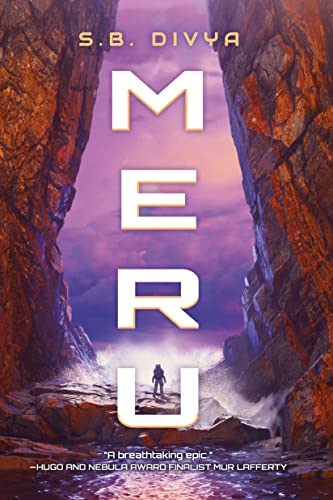enne📚 reviewed Meru: (The Alloy Era Book 1) by S.B.Divya (The Alloy Era, #1)
Meru
3 stars
When a post-human spacecraft and a human love each other very much...
Overall, I had mixed feelings about this book. The writing is from the third perspective of Jayanthi (the human) and Vaha (the post-human Alloy pilot/spacecraft), but is very much in each of their thoughts. Subjectively, it felt like a matter of fact writing style that just didn't quite grip me. I wish I could pin down more why I struggled here with this prose. That said, there were a bunch of things I enjoyed about it:
This book played with some neat ideas. One is that "all matter possesses some level of consciousness" and thus people are encouraged to change themselves rather than environments were possible (big To Be Taught, If Fortunate feelings). Jayanthi has sickle cell anemia, and the book uses this as a prime example of talking about how bodies are not good or …
When a post-human spacecraft and a human love each other very much...
Overall, I had mixed feelings about this book. The writing is from the third perspective of Jayanthi (the human) and Vaha (the post-human Alloy pilot/spacecraft), but is very much in each of their thoughts. Subjectively, it felt like a matter of fact writing style that just didn't quite grip me. I wish I could pin down more why I struggled here with this prose. That said, there were a bunch of things I enjoyed about it:
This book played with some neat ideas. One is that "all matter possesses some level of consciousness" and thus people are encouraged to change themselves rather than environments were possible (big To Be Taught, If Fortunate feelings). Jayanthi has sickle cell anemia, and the book uses this as a prime example of talking about how bodies are not good or bad but rather ones that are more or less suited to particular environments. Along these same lines, the Alloys can go through a process of "full rebirth" and totally change their bodies and genetics, although there's some limits there.
There's a surprising amount of disability topics here too. Jayanthi declines at several points to change her biology to remove ways in which its perceived as hindering her (as well as declining to edit her mind to remove unwanted desires [!!!]). There's also some bits about Vaha's relationship with prostheses and relearning to fly that I think were really well done. All in all, it's more disability politics than I expected even if it feels like a number of perspectives lean on some pragmatic reasoning that "biodiversity is important" and "your lifestyle adaptations may provide useful knowledge to others". (And, these also seem like Jayanthi's own biased perspective as well.)
This is a very different story than a A Half-Built Garden but there's some echoes of it regarding the parentalism towards humans and the climax of the book focusing on legal arguments. In this book, I feel like the Alloys have a more well-trodden "can't trust these humans based on their past behavior" bent (vs the Ringers more novel "our own vast experience tells you you're wrong"), but I feel like this book takes it to new places, where it tries to ask questions about how to determine when a group of people have changed enough to be owed self-determination.

